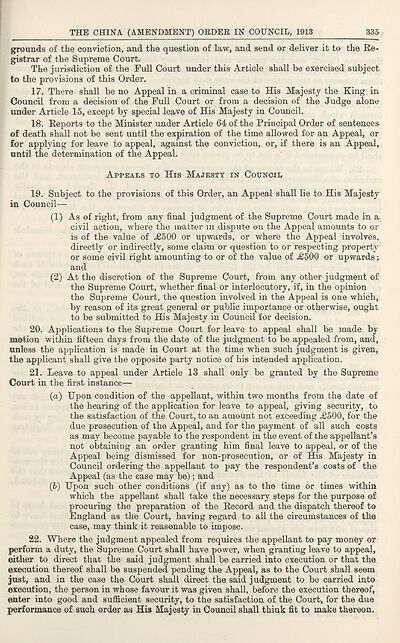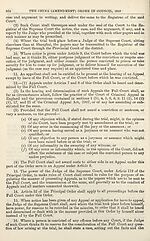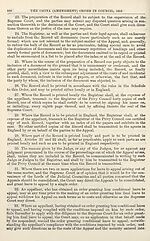1928
(307) Page 335
Download files
Complete book:
Individual page:
Thumbnail gallery: Grid view | List view

THE CHINA (AMENDMENT) ORDER IN COUNCIL, 1913 335
grounds of the conviction, and the question of law, and send or deliver it to the Re¬
gistrar of the Supreme Court.
The jurisdiction of the Full Court under this Article shall be exercised subject
to the provisions of this Order.
17. There shall be no Appeal in a criminal case to His Majesty the King in
Council from a decision of the Full Court or from a decision of the Judge alone
under Article 15, except by special leave of His Majesty in Council.
18. Reports to the Minister under Article 64 of the Principal Order of sentences
of death shall not be sent until the expiration of the time allowed for an Appeal, or
for applying for leave to appeal, against the conviction, or, if there is an Appeal,
until the determination of the Appeal.
Appeals to His Majesty in Council
19. Subject to the provisions of this Order, an Appeal shall lie to His Majesty
in Council—
(1) As of right, from any final judgment of the Supreme Court made in a
civil action, where the matter m dispute on the Appeal amounts to or
is of the value of =£500 or upwards, or where the Appeal involves,
directly or indirectly, some claim or question to or respecting property
or some civil right amounting to or of the value of <£500 or upwards;
and
(2) At the discretion of the Supreme Court, from any other judgment of
the Supreme Court, whether final or interlocutory, if, in the opinion
the Supreme Court, the question involved in the Appeal is one which,
by reason of its great general or public importance or otherwise, ought
to be submitted to His Majesty in Council for decision.
20. Applications to the Supreme Court for leave to appeal shall be made by
motion within fifteen days from the date of the judgment to be appealed from, and,
unless the application is made in Court at the time when such judgment is given,
the applicant shall give the opposite party notice of his intended application.
21. Leave to appeal under Article 13 shall only be granted by the Supreme
Court in the first instance—
(a) Upon condition of the appellant, within two months from the date of
the hearing of the application for leave to appeal, giving security, to
the satisfaction of the Court, to an amount not exceeding <£500, for the
due prosecution of the Appeal, and for the payment of all such costs
as may become payable to the respondent in the event of the appellant’s
not obtaining an order granting him final leave to appeal, or of the
Appeal being dismissed for non-prosecution, or of His Majesty in
Council ordering the appellant to pay the respondent’s costs of the
Appeal (as the case may be); and
(5) Upon such other conditions (if any) as to the time or times within
which the appellant shall take the necessary steps for the purpose of
procuring the preparation of the Record and the dispatch thereof to
England as the Court, having regard to all the circumstances of the
case, may think it reasonable to impose.
22. Where the judgment appealed from requires the appellant to pay money or
perform a duty, the Supreme Court shall have power, when granting leave to appeal,
either to direct that the said judgment shall be carried into execution or that the
execution thereof shall be suspended pending the Appeal, as to the Court shall seem
just, and in the case the Court shall direct the said judgment to be carried into
execution, the person in whose favour it was given shall, before the execution thereof,
enter into good and sufficient security, to the satisfaction of the Court, for the due
performance of such order as His Majesty in Council shall think fit to make thereon.
grounds of the conviction, and the question of law, and send or deliver it to the Re¬
gistrar of the Supreme Court.
The jurisdiction of the Full Court under this Article shall be exercised subject
to the provisions of this Order.
17. There shall be no Appeal in a criminal case to His Majesty the King in
Council from a decision of the Full Court or from a decision of the Judge alone
under Article 15, except by special leave of His Majesty in Council.
18. Reports to the Minister under Article 64 of the Principal Order of sentences
of death shall not be sent until the expiration of the time allowed for an Appeal, or
for applying for leave to appeal, against the conviction, or, if there is an Appeal,
until the determination of the Appeal.
Appeals to His Majesty in Council
19. Subject to the provisions of this Order, an Appeal shall lie to His Majesty
in Council—
(1) As of right, from any final judgment of the Supreme Court made in a
civil action, where the matter m dispute on the Appeal amounts to or
is of the value of =£500 or upwards, or where the Appeal involves,
directly or indirectly, some claim or question to or respecting property
or some civil right amounting to or of the value of <£500 or upwards;
and
(2) At the discretion of the Supreme Court, from any other judgment of
the Supreme Court, whether final or interlocutory, if, in the opinion
the Supreme Court, the question involved in the Appeal is one which,
by reason of its great general or public importance or otherwise, ought
to be submitted to His Majesty in Council for decision.
20. Applications to the Supreme Court for leave to appeal shall be made by
motion within fifteen days from the date of the judgment to be appealed from, and,
unless the application is made in Court at the time when such judgment is given,
the applicant shall give the opposite party notice of his intended application.
21. Leave to appeal under Article 13 shall only be granted by the Supreme
Court in the first instance—
(a) Upon condition of the appellant, within two months from the date of
the hearing of the application for leave to appeal, giving security, to
the satisfaction of the Court, to an amount not exceeding <£500, for the
due prosecution of the Appeal, and for the payment of all such costs
as may become payable to the respondent in the event of the appellant’s
not obtaining an order granting him final leave to appeal, or of the
Appeal being dismissed for non-prosecution, or of His Majesty in
Council ordering the appellant to pay the respondent’s costs of the
Appeal (as the case may be); and
(5) Upon such other conditions (if any) as to the time or times within
which the appellant shall take the necessary steps for the purpose of
procuring the preparation of the Record and the dispatch thereof to
England as the Court, having regard to all the circumstances of the
case, may think it reasonable to impose.
22. Where the judgment appealed from requires the appellant to pay money or
perform a duty, the Supreme Court shall have power, when granting leave to appeal,
either to direct that the said judgment shall be carried into execution or that the
execution thereof shall be suspended pending the Appeal, as to the Court shall seem
just, and in the case the Court shall direct the said judgment to be carried into
execution, the person in whose favour it was given shall, before the execution thereof,
enter into good and sufficient security, to the satisfaction of the Court, for the due
performance of such order as His Majesty in Council shall think fit to make thereon.
Set display mode to:
![]() Universal Viewer |
Universal Viewer | ![]() Mirador |
Large image | Transcription
Mirador |
Large image | Transcription
Images and transcriptions on this page, including medium image downloads, may be used under the Creative Commons Attribution 4.0 International Licence unless otherwise stated. ![]()
| Asian directories and chronicles > 1928 > (307) Page 335 |
|---|
| Permanent URL | https://digital.nls.uk/196633863 |
|---|
| Description | (Pagination skips from p. 143-224) |
|---|---|
| Attribution and copyright: |
|
| Description | Volumes from the Asian 'Directory and Chronicle' series covering 1917-1941, but missing 1919 and 1923. Compiled annually from a multiplicity of local sources and research. They provide listings of each country's active corporations, foreign residents and government agencies of all nationalities for that year, together with their addresses. Content includes: various treaties; coverage of conflicts; currencies and taxes; consular fees; weights and measures; public holidays; festivals and traditions. A source of information for both Western states and communities of foreigners living in Asia. Published by Hongkong Daily Press. |
|---|---|
| Shelfmark | H3.86.1303 |
| Additional NLS resources: |

